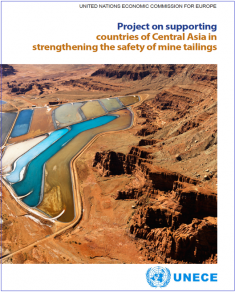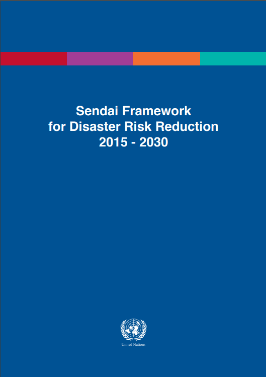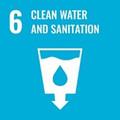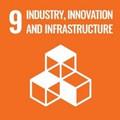
Introduction
During the two-year period of 2020-2021, UNECE is implementing the Project on supporting countries of Central Asia in strengthening the safety of mine tailings, thanks to financial support from the Swiss Federal Office for the Environment. The Project is carried out under the auspices of the UNECE Convention on the Transboundary Effects of Industrial Accidents (Industrial Accidents Convention).
A flyer on the Project on supporting countries of Central Asia in strengthening the safety of mine tailings is available here: 1. English 2. Russian
The Project builds on existing experience in the area of mine tailings safety under the auspices of the UNECE Industrial Accidents Convention, and joint activities with the UNECE Convention on the Protection and Use of Transboundary Watercourses and International Lakes (Water Convention), notably the Joint Expert Group on Water and Industrial Accidents, such as the following:
- UNECE Project to strengthen the safety of mining operations, in particular tailings management facilities (TMFs), in Tajikistan and Central Asia (2019-2020), financed by the Swiss Federal Office for the Environment
- UNECE Project to strengthen the safety of mining operations, in particular TMFs, in Kazakhstan and beyond in Central Asia (2017-2019), financed by the Swiss Federal Office for the Environment
- UNECE Safety Guidelines and Good Practices for Tailings Management Facilities (English, Russian) and a related checklist methodology developed under the leadership of the German Federal Environment Agency
- Project to improve safety conditions of tailings management facilities in the Danube River Basin (2019-2020), Project on Improving the Safety of Tailings Management Facilities in the Caucasian Region (2017-2019), Project on Raising Knowledge among Students and Teachers on Tailings Safety and its Legislative Review in Ukraine (2016-2017), Project on Improving the Safety of Industrial TMFs, based on the example of Ukrainian Facilities (2013-2015) implemented under the leadership of the German Environment Agency under the respective workplans of the UNECE Industrial Accidents Convention.
Project Objectives
The project is aimed at providing support to Central Asian countries in strengthening the safe management of mine tailings and strengthening their transboundary cooperation with neighbouring countries. The project also aims to mobilise Central Asian countries’ engagement in global tailings management activities and to engage with other countries concerned with this issue, such as Brazil, Chile, China and Mongolia.
UNECE is working in close cooperation with the relevant national authorities of the project’s beneficiary countries and in partnership with other relevant international and regional organizations and NGOs in the project’s implementation.
Project beneficiaries





The main beneficiaries of the project are Kazakhstan, Tajikistan and Uzbekistan, namely the competent authorities and operators of these countries, who will lead the project’s implementation, in close cooperation and interaction with the secretariat. The other Central Asian countries, notably Kyrgyzstan and Turkmenistan, will also benefit from the project, in particular through its subregional activities.
1. In Kazakhstan the competent authorities are:
- Ministry of Emergency Situations and its Committee on Industrial Safety
- Ministry of Ecology, Geology and Natural Resources and its Committee for Environmental Regulation and Control
- Ministry of Internal Affairs and its Committee of Emergency Situations
2. In Tajikistan the competent authorities are:
- State Oversight Service for the Safe Operation of Industry and Mining Supervision under the Government of the Republic of Tajikistan
- Ecology Committee under the Government of the Republic of Tajikistan
- Committee of Emergency Situations and Civil Defence under the Government of the Republic of Tajikistan
- Ministry of Energy and Water Resources
3. In Uzbekistan the competent authorities are:
- Ministry of Emergency Situations
- Ministry of Water Resources
- State Committee on Industrial Safety
- State Committee on Ecology and Environmental Protection
The project focuses on enhancing the capacity of national competent authorities to effectively manage the safety of mine tailings in order to prevent industrial accidents in Central Asian countries. It also supports beneficiary countries in implementing the recommendations arising from the Environmental Performance Reviews (EPRs) for Central Asia.
- In Kazakhstan, for example, the project will help the country (1) Ensure coordination among its competent authorities under the Convention, and (2) Proceed with the identification of hazardous activities with possible transboundary effects, and their notification to potentially affected countries (recommendation 11.3 para (b) and (e), 3rd EPR 2019);
- In Tajikistan, the project will support the country in (1) Ensuring continuous involvement of the relevant bodies in activities under the Industrial Accidents Convention and (2) Engaging in national capacity building activities to strengthen institutional structures and policymaking on industrial accident prevention, preparedness and response (recommendation 15.5 para (b) and (d), 3rd EPR 2017);
- The project will support Uzbekistan in the implementation of the UNECE tools such as the Safety Guidelines and Good Practices for Tailings Management Facilities and a related Checklist Methodology which will be applied in the preparation of a hazard rating list and a map of tailings sites. This links directly to the recommendation 15.5 (c): Identify hazardous activities that may cause accidents with potential transboundary effects and subsequently notify its neighbours of such activities (3rd EPR 2020);
- All other Central Asian countries will be involved through participating in the project’s activities, notably in a subregional workshop for the countries of Central Asia and beyond which is aimed at enhancing subregional cooperation between the competent authorities and exchanging good practices across the region.
Project Activities
The project will be implemented in 2020-2022 and its key activities are the following:
- Two national meetings in Kazakhstan aimed at the establishment and operation of an inter-institutional working group on mine tailings safety and prevention of accidental water pollution;
- Two national meetings in Tajikistan aimed at the establishment and operation of an inter-institutional working group on mine tailings safety and prevention of accidental water pollution;
- Subregional workshop for the countries of Central Asia and beyond;
- Preparation of a hazard rating list and map of tailings in Uzbekistan;
- Activities to share experience and knowledge with countries beyond the subregion, for example with Mongolia and other concerned countries (e.g. Seminar on mine tailings safety in the UNECE region and beyond (Online, 01 December 2020));
- Continued engagement and strengthened partnerships with other international organizations, such as with UNDP, UN Environment, OECD and others.
The project activities will assist the competent authorities of the beneficiary countries in improving inter-institutional coordination on managing tailings facilities and in applying UNECE tools to strengthen mine tailings safety. UNECE will thereby build on the experience gained by the Water Convention in the establishment of National Policy Dialogues (NPDs) on integrated water resource management and water supply and sanitation in Central Asia, with a possibility to make use of synergies between the two processes.
The project also aims at strengthening cross-border cooperation and applying its results in other countries of Central Asia and beyond, which will be enhanced by conducting a subregional workshop.
Expected project results
The expected project results are:
- Improved coordination among national authorities, and other relevant stakeholders in the area of strengthening the safety of and preventing pollution from mine tailings
- Strengthened management of disaster risks related to mine tailings and increased level of prevention of mine tailings accidents in Central Asia and beyond
- Enhanced transboundary cooperation in Central Asia on the prevention of water pollution through mine tailings
- Strengthened implementation of the UNECE Industrial Accidents and Water Conventions, and other relevant policy recommendations, in particular the UNECE EPRs for Central Asia
- Improved knowledge and use of existing tools to safely manage mine tailings, developed by UNECE or partners, such as the Safety Guidelines and Good Practices for Tailings Management Facilities, the Checklist methodology and the Global Industry Standard on Tailings Management.
Why is the project needed?
Central Asian countries rely heavily on economic activities that extract and process minerals and metals. These activities inevitably result in the creation of waste containing hazardous substances, which is then stored in mine tailings. Tailings failures can release tsunami-like waves of hazardous waste, resulting into the loss of life, soil and water contamination. Such must be prevented.
The expected increase in the demand for minerals and metals will certainly increase the amount of waste with hazardous substances. Therefore, it is important to strengthen the safety not only of existing, but also of new tailings facilities in Central Asia in order to prevent the accidental release of hazardous substances into the environment. To this end, to ensure the safe management of mine tailings facilities, national standards should be up-to-date.
The main challenges related to TMFs in beneficiary countries are:
- Abandoned, improperly handled or orphaned TMFs store enormous quantities of hazardous substances, and thus pose a threat that could trigger industrial accidents, including accidents with transboundary effects, and result in water and soil contamination
- Outdated safety standards to manage existing tailings facilities and a long approval processes for operators to get a license for new mine tailings facilities, especially in view of the expected future increase in the demand of metals and minerals
- Accidental water pollution, due to the leakage or failure of TMFs, affects the drinking water quality and quantity across the region, and can lead to severe transboundary impacts
- Lack of interinstitutional coordination and a holistic national approach towards the safe management of mine tailings and the prevention of accidental water pollution
- Need to review and update relevant regulations and safety standards at a local and national levels in order to harmonize them with the international good practices and safety standards
- Transboundary cooperation on the safe management of active and inactive TMFs at the subregional level
To this end, the current project aims to support Central Asian countries in strengthening the safe management of mine tailings.

Linkages with Sendai Framework for Disaster Risk Reduction for 2015-2030 and the 2030 Agenda for Sustainable Development
The project will support beneficiary countries in implementing the Sendai Framework for Disaster Risk Reduction for 2015-2030, notably in achieving its objectives and four priorities:
- Enhance the understanding of disaster risk
- Strengthen disaster risk governance in order to decrease disaster risk
- Invest in disaster risk reduction for resilience
- Enhance disaster preparedness

Moreover, the project will support beneficiary countries in achieving the 2030 Agenda for Sustainable Development and its Sustainable Development Goals (SDGs), notably the following:
- SDG 6 /target 6.3: to improve water quality by 2030, by minimizing the release of hazardous chemicals and materials, and
- SDG 9 to build resilient infrastructure, promote inclusive and sustainable industrialization and foster innovation

